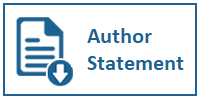Pengaruh Likuiditas, Profitabilitas, Reputasi KAP, Kepemilikan Publik, dan Opini Audit Terhadap Ketepatan Waktu Penyampaian Laporan Keuangan
DOI:
https://doi.org/10.31937/akuntansi.v3i2.436Abstract
The objective of the empirical study is to examine liquidity (CR), profitability (ROA), reputation of accountant public firms (KAP), public ownership and audit opinion towards the timeliness of delivering financial statement.
This research is using 63 manufacturing companies which listed in Indonesian Stock Exchange from period 2008 – 2010. In this data analysis the technique used is logistic regression to test: an overall model fit by using the -2Log Likelihood, assess the feasibility of a regression model using the Hosmer and Lemeshow's Goodness of fit, Cox and Snell's R Square and Nagelkerke's R Square and parameter estimation and interpretation using the classification table.
The results from this study are (1) liquidity had no significant influence to the timeliness of delivering financial statements (2) profitability had no significant influence to the timeliness of delivering financial statements (3) reputation of accountant public firms (KAP) had no significant influence to the timeliness of delivering financial statements (4) public ownership had no significant influence to the timeliness of delivering financial statement (5) audit opinion had no significant influence to the timeliness of delivering financial statement (6) liquidity (CR), profitability (ROA), reputation of accountant public firms (KAP), public ownership and audit opinion had significant influence to the timeliness of delivering financial statement.
Keyword: Liquidity, Profitability, Reputation of accountant public firms (KAP), Shareholder's dispersion, Audit opinion, Timeliness of delivering financial statement.
Downloads
Downloads
Published
How to Cite
Issue
Section
License
Authors retain copyright and grant the journal right of first publication with the work simultaneously licensed under a Creative Commons Attribution-ShareAlike International License (CC-BY-SA 4.0) that allows others to share the work with an acknowledgement of the work's authorship and initial publication in this journal.
Authors are able to enter into separate, additional contractual arrangements for the non-exclusive distribution of the journal's published version of the work (e.g., post it to an institutional repository or publish it in a book), with an acknowledgement of its initial publication in this journal.















